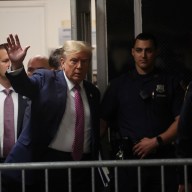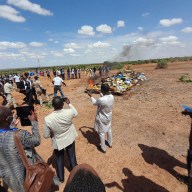By Nicolás Misculin and Saul Hudson
BUENOS AIRES (Reuters) – President Mauricio Macri said Argentina’s economy will grow 3.5 percent in 2017, driven by fresh investment as the country recovers from recession and stubbornly high inflation. Macri told Reuters that investment is already picking up, especially in agriculture, and that monthly inflation will come down steadily.
A former businessman whose election victory in November ended 12 years of leftist policies, Macri said the economy will stabilize in the last quarter of 2016 and grow 3.5 percent next year.
It was a more optimistic prediction than one he gave last month, when he put 2017 growth at between 3 and 3.5 percent.
“There are sectors that have reacted with dynamism. The first was farming,” he said in an interview at the Casa Rosada presidential palace on Monday as part of a Reuters Summit event on Argentina. Since taking office in December, the 57-year-old Macri has pushed through a string of pro-business reforms but the economy has not yet recovered.
Despite government predictions of quicker improvements, the economy is expected to shrink about 1.5 percent in 2016 and economists say inflation will end the year at around 40 percent.
Key industries like car manufacturing and construction are still struggling and some economists worry the much-needed investment at the heart of Macri’s economic plan is not coming in quickly enough. Macri said recession in neighboring Brazil, which is Argentina’s No. 1 trade partner, was slowing down the recovery but that he was “satisfied” with the levels of new investment since he took power. He said more will flow as his center-right government brings inflation under control, adding that he is optimistic it will drop to 17 percent next year.
“Month by month it is starting to come down. That will generate stability to strengthen the investment process, which is what will generate jobs,” he said.
TENSIONS
Eight months into his presidency, Macri still enjoys broad support but policies cutting government payrolls and reducing subsidies on utility bills have led to some strikes and protests.
Trying to tackle poverty and boost employment, the government announced a $7 billion infrastructure plan, although it has yet to spend much of the money.
It is also seeking new sources of money to spur growth, offering an amnesty to Argentines with money abroad so they can legally repatriate funds at a steeply discounted tax rate by investing them in local mutual funds or government bonds. Spending on infrastructure and pensions and a plan to cut income taxes could further weaken government finances, although Macri still said “we would like to” meet the fiscal deficit target of 3.3 percent in 2017. Aides say Macri is strict about punctuality, fining ministers who arrive late for meetings, and also keeps a close eye on the use of gas and electricity.
Some officials say he often turns off lights as he moves around the presidential palace if he thinks there is no need to have them on.
The interview with Reuters took place in a room without heating despite the cold of Buenos Aires, which is now in the southern hemisphere winter.
Lacking a majority in Congress, Macri could become politically vulnerable if opposition Peronist leaders turn on him and mobilize powerful labor unions against the government.
But he has so far had the support of many Peronist lawmakers and state governors despite the enmity of former President Cristina Fernandez, a still prominent Peronist, and he insists he can keep them on board. “We are learning the practice of permanent dialogue,” he said.
(Reporting by Nicolas Misculin and Saul Hudson; Editing by Kieran Murray)













